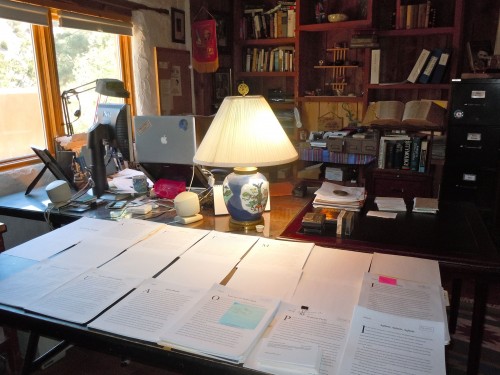August 6th, 2013
If your forthcoming book is not listed below, drop us a line.
August
The Winter Sun Shines In: A Life of Masaoka Shiki by Donald Keene (Columbia University Press)
Mathew Brady: Portraits of a Nation by Robert Wilson (Bloomsbury)
These Few Precious Days: The Final Year of Jack with Jackie by Christopher Andersen (Gallery Books)
Benjamin Britten: A Life for Music by Neil Powell (Henry Holt and Co.)
King Faisal of Saudi Arabia: Personality, Faith and Times by Alexei Vassiliev (Saqi Books)
Gloria Swanson: The Ultimate Star by Stephen Michael Shearer and Jeanine Basinger (Thomas Dunne Books)
Crazy Rich: Power, Scandal, and Tragedy Inside the Johnson & Johnson Dynasty by
Jerry Oppenheimer (St. Martin’s Press)
September
Brave Genius: A Scientist, a Philosopher, and Their Daring Adventures from the French Resistance to the Nobel Prize by Sean B. Carroll (Crown)
Wilson by A. Scott Berg (Putnam)
Empty Mansions: The Mysterious Life of Huguette Clark and the Spending of a Great American Fortune by Bill Dedman, and Paul Clark Newell, Jr. (Ballantine)
Jim Henson: The Biography by Brian Jay Jones (Ballantine)
American Dictators: Frank Hague, Nucky Johnson, and the Perfection of the Urban Political Machine by Steven Hart (Rutgers University Press)
Not for Turning: The Life of Margaret Thatcher by Robin Harris (Thomas Dunne)
The Many Lives of Miss K: Toto Koopman – Model, Muse, Spy by Jean-Noel Liaut, trans. Denise Jacobs (Rizzoli Ex Libris)
Eugene Braunwald and the Rise of Modern Medicine by Thomas H. Lee
(Harvard University Press)
Kansas City Lightning: The Rise and Times of Charlie Parker by Stanley Crouch
(HarperCollins)
An Atomic Love Story: The Extraordinary Women in Robert Oppenheimer’s Life by Shirley Streshinsky and Patricia Klaus (Turner Publishing Company)
Sydney and Violet: Their Life with T.S. Eliot, Proust, Joyce and the Excruciatingly Irascible Wyndham Lewis by Stephen Klaidman (Nan A. Talese)
The Tudor Rose: Princess Mary, Henry VIII’s Sister by Jennifer Kewley Draskau (The History Press)
A Mysterious Something in the Light: The Life of Raymond Chandler by Tom Williams
(Chicago Review Press)
Junipero Serra: California’s Founding Father by Steven W. Hackel (Hill and Wang)
A Strong Song Tows Us: The Life of Basil Bunting by Richard Burton (Prospecta Press)
No Better Time: The Brief, Remarkable Life of Danny Lewin, the Genius Who Transformed the Internet by Molly Knight Raskin (Da Capo Press)
A Life of Barbara Stanwyck: Steel-True 1907-1940 by Victoria Wilson (Simon & Schuster)
Salinger by David Shields and Shane Salerno (Simon & Schuster)
Arthur Erickson: An Architect’s Life by David Stouck (Douglas & McIntyre)
October
A Man and his Mountain: The Everyman who Created Kendall-Jackson and Became America’s Greatest Wine Entrepreneur by Edward Humes (PublicAffairs)
Self-help Messiah: Dale Carnegie and Success in Modern America by Steven Watts (Other Press)
Lincoln in the World: The Making of a Statesman and the Dawn of American Power by
Kevin Peraino (Crown)
Norman Mailer: A Double Life by J. Michael Lennon (Simon & Schuster)
Nicholson: A Biography by Marc Eliot (Crown Archetype)
Paul Robeson: A Watched Man by Jordan Goodman (Verso)
Bernard Berenson: A Life in the Picture Trade by Rachel Cohen (Yale University Press
Kurt Cobain: The Nirvana Years by Carrie Borzillo (Carlton Books)
Once Upon a Time: The Lives of Bob Dylan by Ian Bell (Pegasus)
The Worlds of Sholem Aleichem: The Remarkable Life and Afterlife of the Man Who Created Tevye by Jeremy Dauber (Schocken)
Patrick Leigh Fermor: An Adventure by Artemis Cooper (New York Review Books)
Johnny Cash: The Life by Robert Hilburn (Little, Brown and Company)
Duke: A Life of Duke Ellington by Terry Teachout (Gotham)
Torment Saint: The Life of Elliott Smith by William Todd Schultz (Bloomsbury)
Last Night at the Viper Room: River Phoenix and the Hollywood He Left Behind by Gavin Edwards (It Books)
The Angel of Charleston: Grace Higgens, Housekeeper to the Bloomsbury Set by Stewart MacKay (British Library)
Ian Fleming by Andrew Lycett (St. Martin’s Press)
The New Royal Family: Prince George, William and Kate, the Next Generation by
Rob Jobson and Arthur Edwards (John Blake)
Kate: A Biography by Marcia Moody (Michael O’Mara)
George Washington: Gentleman Warrior by Stephen Brumwell (Quercus Publishing)
JFK in the Senate: Pathway to the Presidency by John T. Shaw (Palgrave Macmillan)
Mob Boss: The Life of Little Al D’Arco, the Man Who Brought Down the Mafia
Jerry Capeci and Tom Robbins (Thomas Dunne Books)
Jack London: An American Life by Earle Labor (Farrar, Straus and Giroux)
Holding On Upside Down: The Life and Work of Marianne Moore by Linda Leavell (Farrar, Straus and Giroux)
JFK, Conservative by Ira Stoll (Houghton Mifflin Harcourt
Ulysses S. Grant: The Unlikely Hero Michael Korda (Harper)
Johnny Carson by Henry Bushkin (Houghton Mifflin Harcourt)
Queen Anne: The Politics of Passion by Anne Somerset (Knopf)
Breakfast with Lucian : The Astounding Life and Outrageous Times of Britain’s Great Modern Painter by Geordie Greig (Farrar, Straus and Giroux)
Vivien Leigh: An Intimate Portrait by Kendra Bean (Running Press)
Tip and the Gipper: When Politics Worked by Chris Matthews (Simon & Schuster)
Kate: The Future Queen by Katie Nicholl (Weinstein Books)
Crusader for Justice: Federal Judge Damon J. Keith by Trevor W. Coleman and Mitch Albom
(Wayne State University Press)
The Rise of Abraham Cahan by Seth Lipsky (Schocken)
Chef Tell: The Biography of America’s Pioneer TV Showman Chef by Ronald Joseph Kule, Regis Philbin, and Walter Staib (Skyhorse Publishing)
Margaret Thatcher: Power and Personality by Jonathan Aitken (Bloomsbury USA)
Greta Garbo: Divine Star by David Bret (Biteback Publishing, Ltd.)
November
The Man He Became: How FDR Defied Polio to Win the Presidency by James Tobin
(Simon & Shuster)
Pinkerton’s Great Detective: The Amazing Life and Times of James McParland by
Beau Riffenburgh (Viking)
Primo Levi: The Matter of a Life by Berel Lang and Ariella Lang (Yale University Press)
Citizen Emperor: Napoleon in Power by Philip Dwyer (Yale University Press)
Jonathan Swift: His Life and His World by Leo Damrosch (Yale University Press)
Wellington: The Path to Victory 1769-1814 by Rory Muir (Yale University Press)
Lillian Hellman: An Imperious Life by Dorothy Gallagher (Yale University Press)
A Life Worth Living: Albert Camus and the Quest for Meaning by Robert Zaretsky (Belknap Press)
De Gaulle: The Man Who Defied Six US Presidents by Douglas Boyd (The History Press)
Henry VIII: The Life and Rule of England’s Nero by John Matusiak (The History Press)
Rav Kook: Mystic in a Time of Revolution by Yehudah Mirsky (Yale University Press)
Phil Jackson: Lord of the Rings by Peter Richmond (Blue Rider Press)
American Mirror: The Life and Art of Norman Rockwell by Deborah Solomon (Farrar, Straus and Giroux)
Furious Cool: Richard Pryor and the World That Made Him by David Henry and Joe Henry (Algonquin Books)
End of Days: The Assassination of John F. Kennedy by James L. Swanson (William Morrow)
December
Musorgsky and His Circle: A Russian Musical Adventure by Stephen Walsh (Knopf)
Glorious War: The Civil War Adventures of George Armstrong Custer by Thom Hatch (St. Martin’s)
Ryan Gosling: Hollywood’s Finest by Nick Johnstone (John Blake)
Harry: A Biography by Marcia Moody (Michael O’Mara)
Beethoven: The Man Revealed by John Suchet (Atlantic Monthly Press)
The Heir Apparent: A Life of Edward VII, the Playboy Prince by Jane Ridley (Random House)
William and Dorothy Wordsworth: ‘All in each other’ by Lucy Newlyn (Oxford University Press)
Robert Plant: A Life by Paul Rees (It Books)
The Kid: The Immortal Life of Ted Williams by Ben Bradlee (Little, Brown and Company)
Cadwallader Colden: A Biography by Seymour I. Schwartz (Humanity Books)
Tennyson: To Strive, To Seek, To Find by John Batchelor (Pegasus)
I’ll Take You There: Mavis Staples, the Staple Singers, and the March up Freedom’s Highway by Greg Kot (Scribner)
Call Me Burroughs: A Life by Barry Miles (Twelve)
Emperor Huizong by Patricia Buckley Ebrey (Harvard University Press)
Walter Benjamin: A Critical Life by Howard Eiland and Michael W. Jennings (Belknap Press)
Space Has No Frontier: The Terrestrial Life and Times of Bernard Lovell by John Bromley-Davenport (Bene Factum Publishing)
Hitler’s Valkyrie: The Uncensored Biography of Unity Mitford by David R. L. Litchfield (The History Press)
Giuseppe Tomasi di Lampedusa: A Biography Through Images by Gioacchino Lanza Tomasi and David Gilmour (Alma Books)
Pat and Dick: The Nixons, An Intimate Portrait of a Marriage by Will Swift (Threshold Editions)
Arik: The Life of Ariel Sharon by David Landau (Knopf)
Wooden: A Coach’s Life by Seth Davis (Times Books)
Dashiell Hammett: Man of Mystery by Sally Cline (Arcade Publishing)
George Orwell: English Rebel by Robert Colls (Oxford University Press)
Lincoln’s Boys: John Hay, John Nicolay, and the War for Lincoln’s Image by Joshua Zeitz (Viking)
The Double Life of Paul De Man by Evelyn Barish (Liveright)
February
Faisal I of Iraq by Ali A. Allawi (Yale University Press)
E. E. Cummings: A Life by Susan Cheever (Pantheon)
James and Dolley Madison: America’s First Power Couple by Bruce Chadwick (Prometheus Books)
Eliot Ness: The Rise and Fall of an American Hero by Douglas Perry (Viking)
Brooks: The Biography of Brooks Robinson by Doug Wilson (St. Martin’s)

